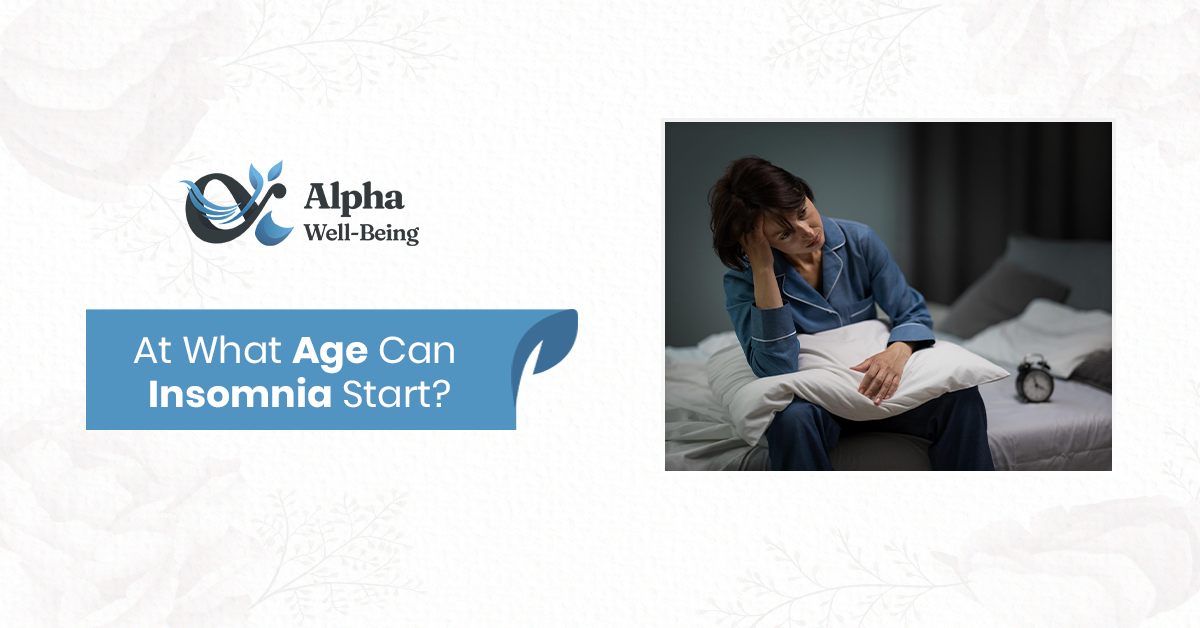Sleep is the unseen hero who comes to our rescue in total silence. It gives us a leg up on development, helps recover injuries, and makes us happy and content. But what unfolds when sleep is hard to get? Insomnia is always ready to strike.
You may wonder, “At what age can insomnia start?” Insomnia can begin at any age. It affects people from toddlers to grandparents.
We will examine the effects of insomnia, which affects people of every age group. We will explain why insomnia occurs while offering essential improvement advice suitable for everyone.
Are you struggling with chronic fatigue insomnia? Alpha Wellbeing Care turns restless nights into peaceful sleep. Let’s heal, one dream at a time. Contact us today.
What Exactly Is Insomnia?
Insomnia extends beyond normal sleep difficulty since it creates several additional sleep-related problems. By definition, an insomniac struggles to fall or stay asleep, leading to daytime fatigue. It means:
- People spend numerous hours unable to sleep during their attempts to drift off.
- The patient wakes up too many times during the night.
- Feeling exhausted even after time spent “still in bed” often leads to problems getting out of bed in the morning.
Many people ask, “What does asleep mean?” For most, sleep is a time for the body and mind to rest. But for insomniacs, it seems impossible to reach this state. The mental state of people with insomnia leads them to become deeply frustrated. The constant thinking sound effect of a racing mind is a common experience for those with insomnia. The issues with mind calmness are major for those experiencing insomnia. But at what age can insomnia start? Let’s break it down!
Insomnia in Kids: Yes, Even Little Ones!
Many parents think, “Kids sleep like rocks!” But children can develop insomnia, too. Here’s how:
Toddlers (1–3 years):
- Fear of the dark or nightmares.
- Too much energy is generated by sugary snacks or screen time.
- Changes like a new sibling or daycare.
School-Aged Kids (6–12 years):
- Stress about school, friends, or sports.
- Too much homework or video games before bed.
- Breathing difficulty represents a nighttime complication that arises due to allergies or asthma.
Cranky kids often need better sleep habits. If children struggle in the morning, better sleep practices may help.
Teenagers: The Sleep-Deprived Generation
Teens need 8–10 hours of sleep, but most get less. Why?
Reasons for Teen Insomnia:
- Hormones: Their internal clock shifts, making them feel awake at midnight.
- Phones & Screens: Scrolling social media keeps brains active.
- Pressure: Tests, college plans, or friend drama cause stress.
Late-night texts or thoughts like, “Does he know you call me when he sleeps?” can keep teens awake, overthinking their relationships. A tired teen might sleep until noon on weekends or groan, “I’m still in bed, don’t make me get up!” Their body needs rest. Teens often wonder, “What does falling for someone mean?” as they navigate relationships, which can add emotional stress and disrupt sleep. If considering light sleepers vs heavy sleepers, teens often fall into the light sleeper category due to their heightened sensitivity to stress and external stimuli.
Adults: When Life Keeps You Awake
Adults juggle jobs, bills, and family, so sleep suffers! Common causes include:
- Work Stress: Meeting deadlines or working night shifts.
- Health Issues: Pain, asthma, or wondering, “Does high blood pressure cause sleep problems?” While high blood pressure doesn’t directly ruin sleep, the stress linked to it can make your heart race at night.
- New Parents: Babies waking every 2–3 hours train parents’ brains to stay alert.
Adults with chronic fatigue insomnia (feeling tired no matter how long they sleep) often feel stuck. Poor sleep leads to coffee overdoses, which leads to worse sleep, it’s a vicious cycle! For those who are light sleepers, even minor disturbances can lead to sleepy nights and groggy mornings.
Seniors: Aging and Restless Nights
Older adults often say, “I don’t sleep like I used to.” Normal changes include:
- Waking up at 4 a.m. and struggling to fall back asleep.
- Napping during the day confuses their sleep schedule.
- Health problems like arthritis or frequent bathroom trips.
But seniors shouldn’t ignore insomnia. Sleep deprivation can cause falls and memory problems. Seniors often ask, “Why am I falling so much?” Lack of sleep can mess with balance and coordination. This raises the chance of people falling over. If Grandpa says, “I’m still in bed but never rested,” it’s time to see a health care provider.
Will Your Body Force You to Sleep? The Truth!
Have you ever stayed up all night and questioned, “Will your body force you to sleep?” Yes, but watch out. After 24+ hours without sleep, your brain takes “microsleeps” (5–10 second naps) without asking you. Imagine dozing off while driving. It’s scary, right? Instead of pushing limits, fix sleep issues early!
How to Fight Insomnia at Every Age
Good sleep habits work for kids, teens, adults, and seniors. Try these tips:
1. Build a Sleep Routine
- A fixed sleep schedule for every day should be followed rigorously.
- The relaxing nighttime bath serves as a sign to prepare for sleep.
2. Ban Screens Before Bed
- Phones, TVs, and tablets send signals to our brains. They emit blue light, making our brains think it’s daytime.
- Instead of scrolling through social media, try watching calming shows to watch before bed to relax your mind.
- Reading a book or coloring activities provide better alternatives to phone use.
3. Create a Sleep Sanctuary
- Make rooms calm and quiet with blackout curtains.
- Consider using nighttime sounds for sleep, like white noise or calming nature sounds, to create a soothing environment.
- Avoid using beds for homework or video games, train your brain to link beds with sleep.
4. Move Your Body (But Not Too Late!)
- Exercise helps tire you out, but avoid workouts 2–3 hours before bed.
5. Worry Journal
- Write down fears or to-do lists before bed. It stops your mind from racing at 2 a.m.!
Pro Tip: If you’re “hard to get out of bed” every morning, try these tricks:
- Place your alarm clock far from the bed.
- Let the sunlight in by opening the curtains.
- Wake up to lively music.
When Insomnia Won’t Quit: Time to Ask for Help
Occasional sleepless nights are regular. But if you:
- Struggle to sleep 3+ nights a week for a month.
- Feel dizzy, forgetful, or moody all day.
- Snore loudly or gasp for air at night (signs of sleep apnea).
- Wonder, “Does high blood pressure cause sleep problems?” due to constant stress.
See a health care provider about chronic fatigue, insomnia, and sleep apnea. Therapy and melatonin can help.
Myths about Insomnia
Let’s bust common myths:
Myth 1: “Older people need less sleep.”
Truth: Seniors need 7–8 hours, just like adults!
Myth 2: “Alcohol helps you sleep.”
Truth: It makes you drowsy, but ruins sleep quality later.
Final Thoughts: Sleep Well, Live Well!
So, at what age can insomnia start? Any age, but it’s never too late to improve sleep! Small changes can help. This is true for kids with nightmares, teens who spend too much time on screens, or seniors dealing with aches. According to an American sleep study, consistent sleep routines significantly improve overall health and well-being.
Remember:
- Listen to your body. Consider your habits if you are “still in bed” but awake.
- Don’t let exhaustion take over, make a move before you feel tired.
- Sleep isn’t selfish, it’s key to your health, happiness, and success each day!
FAQs
Q. Will your body force you to sleep if you stay too long?
Yes, your brain takes tiny “microsleeps” (seconds of sleep) if you don’t rest. But this is dangerous, so never push your limits!
Q. Do older people need less sleep?
No! Seniors still need 7–8 hours. If they’re “still in bed” but not rested, a health care provider can help find the cause.



No comment